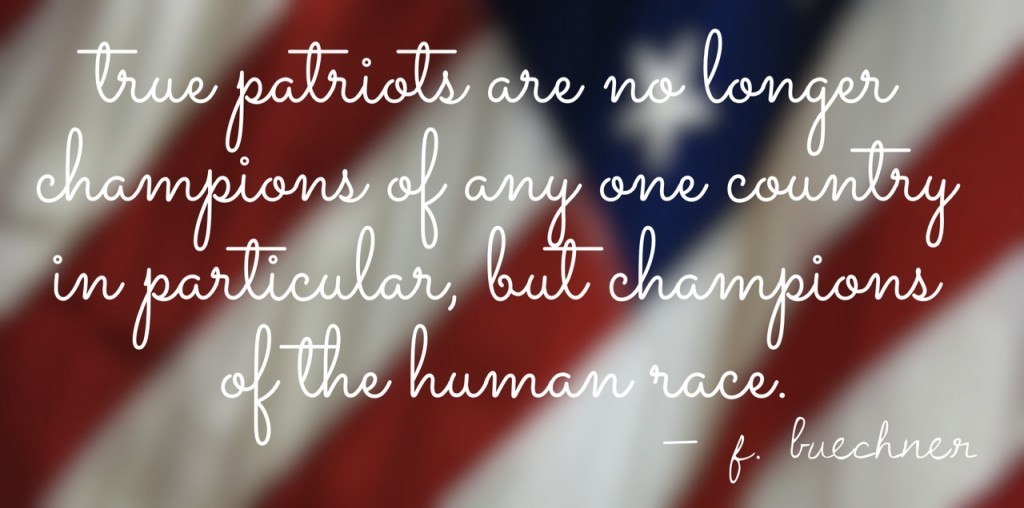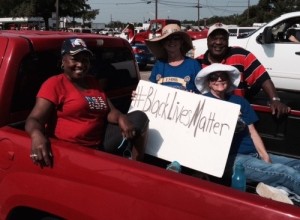My husband put up our flag for the Fourth of July and came back into the house singing the Star Spangled Banner. We both love our country. We’re both grateful for this nation we call home. But, on that particular day, I was surprised to realize how ambivalent I felt about the national anthem and about this flag waving to me from my front yard.
Maybe my problem is with our checkered past.
On July 3, I usually stand on the portico of our County Courthouse and take my turn reading aloud the Declaration of Independence. Every year I cringe when we read the paragraph complaining about the ways King George “excited domestic insurrections amoungst us, and endeavored to bring on the inhabitants of our frontier the merciless Indian Savages…”
The Founders abhorred those evil “merciless Indian Savages.”
Never mind the fact that it was Europeans who mercilessly slaughtered and displaced the Native Peoples as they took over the New World. Never mind the merciless savagery inherent in every war – even in the war for our own independence.
Mark Charles is a wise, bold Native American blogger who reminds us of this complicated American history. In his essay, Reflections from the Hogan: The Dilemma of the Fourth of July, Charles calls us to remember all our national history with all its troubling complexity.
Even as we proclaim that “all men are created equal,” we must also acknowledge how many years it has taken this nation to grow toward the civilized understanding that “all” means ALL. And we must acknowledge that we still have more growing to do.
Maybe my problem is with our checkered present.
Yes, America (finally) turned from our original sin of slavery, but I grieve the ways we continue to allow the underlying sin of racism to skew our society. White supremacy is still very much a thing all across the USA.
Some people live out that exclusivist value with brazen, dangerous animosity. Other people live out a belief in their white privilege more politely.
“Benevolent racism” I call it.
Benevolent racism is not hateful, violent racism but it still contains an attitude of discomfort or disdain whenever people speak different languages, practice different religions, wear different clothing or celebrate different holidays. It still believes that people should “stay in their place.”
As I write this on July 1, 2019, a Muslim ban is in effect, police departments across the land excuse and cover up the killings of unarmed black citizens, and brown children are separated from their parents and warehoused without adequate care at our southern border.
Both our violence and our benevolent racism are creating deep, irreparable damage.
Maybe my problem is with some Christians’ blind practice of a national civil religion.
As a minister, I am deeply troubled by the way authentic Christianity has been co-opted by an American civil religion. On the 4th of July weekend, in flag-draped sanctuaries across the nation, I have to wonder who – or what – is actually being worshiped.
I am happy to recite the pledge and sing our anthem at the Fourth of July fireworks show; that’s an excellent and appropriate venue. But I believe it is crucial for religious people to keep church and state separate within their worship spaces.
So I understand why I am ambivalent about my patriotism. The United States of America is a mixed bag and many Americans are persistently blind to that truth.
Even so, my good husband reminded me that our nation’s ideal is indeed beautiful. Our national anthem sings of the spirit of resilience among our people. Our national flag symbolizes the inherent unity within the inevitable diversity of our people.
This nation of ours remains a dream, a hope, an aspiration.
It is not a dream come true – not yet. Maybe not ever. But it’s still an ideal worth believing in. And it’s absolutely worth working for.
So I guess my challenge to myself is not to allow my funky ambivalence to paralyze me. Instead I will get to work, doing whatever I can to help make this American dream a dream come true for everyone.
I will join with others to support causes that bring us together in welcoming, inclusive community. I will write letters to my local newspaper and to my elected officials. I will blog. I will vote.
I will do whatever I can to help my little piece of America embody its ideals and grow into its dream. I will do what I can to challenge myself and my neighbors to more fully live up to our stated values of equity and justice.
I will do what I can; that’s all any of us can do.
Meme: David R. Henson
Text: Frederick Buechner
Original Photo: Charlotte and friends in the NAACP float at the July 4 Parade, 2015


Our nation’s ideal IS beautiful.. But we know so much more now, about how that ideal has been twisted, ignored, manipulated for the benefit of one group or another. And we perhaps think more subtly, or some of us do, about how we can twist even our best intentions to our own advantage. And formerly oppressed minorities of all colours are rising up and saying, No more — and this is a good thing too.
So maybe it’s time to say that the ideal is unattainable, like sinless perfection. It’s lovely to look at, we should be striving for it, but let’s not ever be complacent enough to say we’ve got there.
Well, that’s what I think, anyway. But then I’ve become a bit of an outsider!